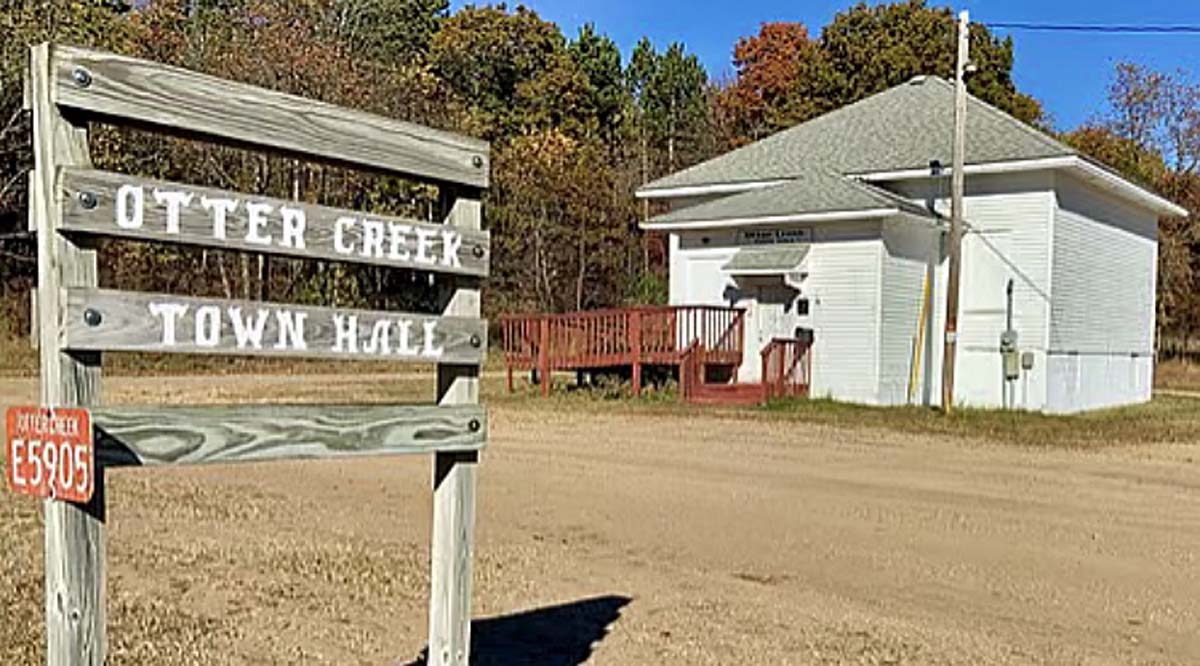
Wikipedia
Otter Creek Town Hall picture
Editor’s Note: This article was written about the November 2024 election and provided a peek into the workings of one small town hall where rural Dunn County elections are held. On April 1 the process will begin again.
For the past year I have been attending and note-taking at the Town Board meetings at the Otter Creek Town Hall. Beverly Bernier, Town Treasurer and Election Inspector, invited me to work the polls November 5th as an Election Helper at the town hall.
The Otter Creek Town Hall is a former one room schoolhouse about 100 years old. It has no running water and no indoor restroom. The Township contracts a porta-potty service for elections and other events. The main room is heated, but when the heat comes on it revives all the insects hiding in the building – wasps, flies, and Asian beetles that harass the workers and voters.
The polling hours are 7 a.m. to 8 p.m. Beverly shows up at 6 a.m. to warm up the building and turn on the machines–a Dominion vote counter and a tablet that scans Identification cards and assists in registering new voters. There is no internet connection at the site, but there is a land line. She also brings jugs of water, an electric kettle, tea, hot chocolate, and candy for the kids that come with their parents. The Chief election inspector, Kelly Hayes and the second Election Inspector, Sharon Coates, arrive a little before 7 a.m. When I arrive at 7:30, there are already some people voting at the five ballot boxes and folks are waiting in line to be verified as legal registered voters.
The first chair does the scanning and voter eligibility, or registers new voters, which requires some computer skills. The second chair hands out and explains the ballots and makes sure they are signed by the first chair.
My duties are much simpler and require little training. I show people where to insert their ballots, remind them to wait for the machine to “ding” before walking away, and offer them the “I Voted” sticker.
All types of people voted – a young man wearing steel toe boots covered in mud, young farm wives in their barn clothes with a baby on the hip and a toddler hugging a leg, retired couples, frail elderly, 18-year-olds voting for their first time, construction workers, business owners, people with disabilities, even some entire families came to cast their ballot.
One of my duties was to stand at the end of the line at 8 p.m. Lucky for me the voting was over by 7:30 p.m. and I did not have to turn anyone away. We prepared for closing as we waited for last-minute voters, or persons returning with proof of residence that had to be turned away earlier (there were only a few).
The election inspectors counted the ballots (absentee and early included), write ins, and read the machine printout tapes, checked and then double checked the counting to make sure the machine and the number of physical ballots were in agreement, and then called the Dunn County Clerk to report the results. There were 323 votes total, out of 323 registered voters, 33 new registrations, and 422 eligible voters out of a population of 532. This means 33 registered voters did not vote.
We worked until 8:45 p.m. Some inspectors’ husbands came and helped with the packing and moving of paperwork and ballots, tearing down of voting boxes, returning the Dominion machine back to its dormant state, and general clean-up of the hall.
It was my privilege to work with these hardworking, dedicated women. They were always professional and conscious of the importance of their job– ensuring that every person can vote and that every vote counts. It was a long hard day, but they were always cheerful, helpful, and kind, and we need them.
Poll workers not only supervise voting and registration, but also give clear instructions on navigating the ballot without influencing how the voter votes—this is especially true with referendums, which can have confusing language. Correctly filled ballots keep the flow going and guarantee correct data.
If you are interested in being a poll worker, here are a few facts. The job does pay, $9 per hour for helpers, and $11 for Chief Inspectors. Election inspectors must go through 6 hours of training before an election. Young poll workers are desirable as they are more computer savvy than most retired persons.
This election showed me how important the vote is and, it is equally important that we have dedicated poll workers who are willing to give their time to civic duty, so we can continue to have our voices heard.
Note: The Town of Otter Creek was one of five municipalities in Dunn County chosen for machine audit. The Town Treasurer/Election Inspector must count all the votes on the paper ballots and make sure that the machine has counted the votes correctly by the end of November.
Renee Carrell is a Town of Otter Creek resident and a new poll worker.